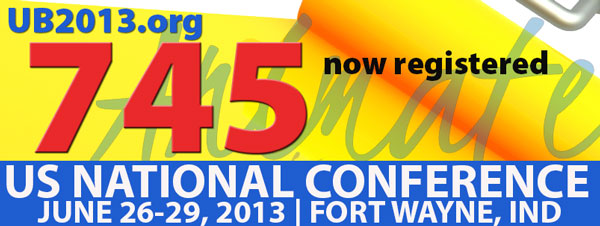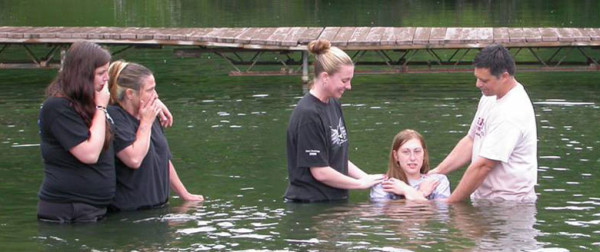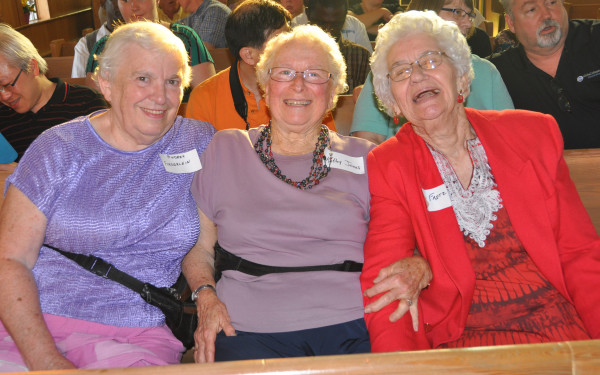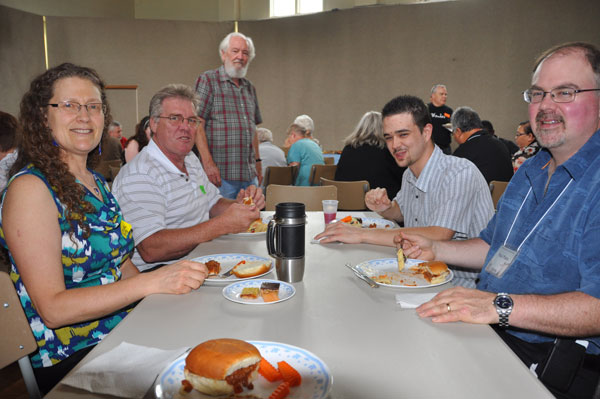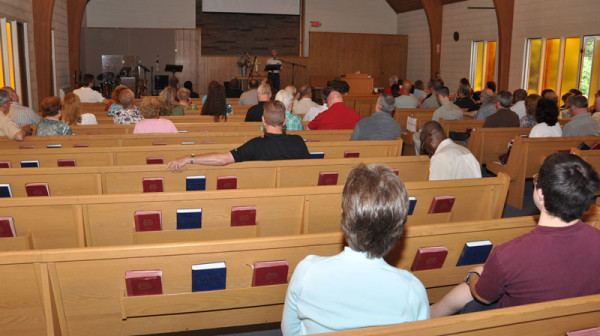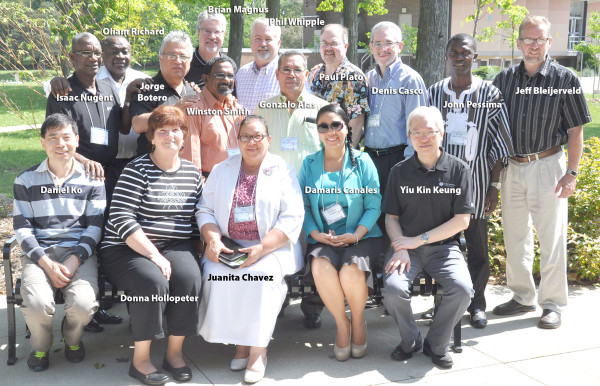(260) 356-2312
07 Jun El Salvador Medical Team: Nov 1-9
 We just received confirmation that the United Brethren churches in El Salvador will host a medical mission team this fall. Rev. Gonzalo Alas (right), superintendent in El Salvador, has recommended the trip for November 1-9, 2013.
We just received confirmation that the United Brethren churches in El Salvador will host a medical mission team this fall. Rev. Gonzalo Alas (right), superintendent in El Salvador, has recommended the trip for November 1-9, 2013.
The team will hold five clinics–one in each of the UB churches in El Salvador.
Cost: $700 per person, plus airfare.
The trip is open to nurses, doctors, pharmacists, and support staff. The team size is being limited to 12 persons.
If you’re interested in participating on this team, please contact Donna Hollopeter in Global Ministries:
Email: [email protected]
Phone: 888-622-3019.
05 Jun Anchor Church Baptizes 14
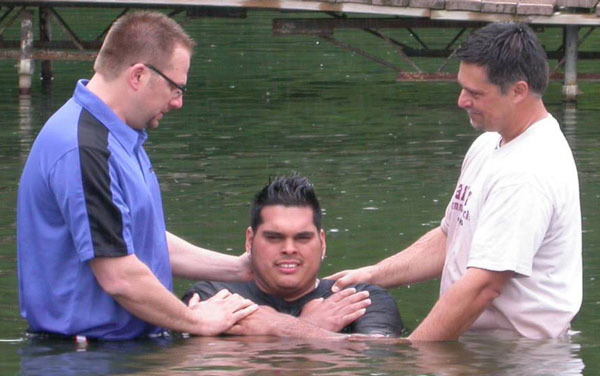
Pastor Tim Hallman (right) and associate pastor Matt Kennedy (left) with one of the baptism candidates.
On Sunday, June 2, Anchor Community Church (Fort Wayne, Ind.) held its annual baptismal service at the Stillwater Retreat just south of Fort Wayne. They’ve been doing this since soon after Anchor began in 1998. Instead of meeting at the church, everyone gathers at Stillwater, bringing along a covered dish and perhaps a chair.
The day began with an outdoor service, with singing and a message from Pastor Tim Hallman. Then everyone walked down to the lake for the baptisms–14 of them. Pastor Hallman conducted the baptisms, with help from associate pastor Tim Hallman and others.
Then it was back to the lodge for lunch, followed by fun and fellowship around the camp. Many more photos are available on Anchor’s Facebook page.
05 Jun Russell Wagner Appointed to Mount Zion UB
 Russell Wagner has been appointed senior pastor of Mount Zion UB church (also known as Bobo) outside of Decatur, Ind. Wagner previously pastored Eagle Quest UB church in Columbia City, Ind., 1997-2001. He has been granted a provisional ministerial license.
Russell Wagner has been appointed senior pastor of Mount Zion UB church (also known as Bobo) outside of Decatur, Ind. Wagner previously pastored Eagle Quest UB church in Columbia City, Ind., 1997-2001. He has been granted a provisional ministerial license.
04 Jun Shirley Fretz – 18 Years in Sierra Leone
Steve Dennie, Communications Director
On the second night of General Conference–Thursday, May 30–the evening service was held at the Grace UB church in Sherkston, Ontario. It was a good place for an international gathering. Grace has been a strong missions-minded church over the years, producing a number of missionaries and faithfully supporting the work of United Brethren missions. Pastor Dan Nickless said they view themselves as a sending church, having raised up so many missionaries and pastors since the church began in 1897.
In the congregation that night were three former missionaries in Sierra Leone:
- Kathy Jones, a nurse at Mattru Hospital 1958-1967.
- Audrey Federlein, who served in Mattru at Centennial Secondary School 1965-1968 in various capacities–math teacher, dean of girls, and for two years, national president of the Christian Endeavor Union.
- Shirley Fretz, who served 18 years in Sierra Leone, 1967-1985.
Back in 1985, after she concluded her missionary service, I interviewed Shirley Fretz and wrote an article for the United Brethren magazine. I tracked it down.
Growing up at Grace UB, Shirley Fretz dreamed of being a missionary, like two other women from the church who were then serving in Sierra Leone–Olive Weaver and Ruth Benner. She spent ten years working for law firms, but couldn’t escape the missionary call. She eventually responded to an altar call by Bishop Clyde W. Meadows, a call to serve Christ wherever he wanted.
Before she knew it, she was contacted by the UB missions office. They needed someone to oversee the Minnie Mull school boarding home in Sierra Leone. Was she interested?
She arrived at Minnie Mull in April 1967. The school had over 400 primary-age girls with 104 staying in the boarding home. Shirley procured supplies, kept financial records, helped supervise cooking and laundry, counseled children, and generally served as a mother to over 100 youngsters.
Her second term, which began in August 1971, found her in a whole new role: business manager of Mattru Hospital. She spent the next ten years at Mattru handling the payroll, bookkeeping, banking, and other non-medical responsibilities. After the October 1974 arrival of Dr. Ron Baker, Shirley watched Mattru develop into a thriving hospital.
In 1981, Shirley decided the hospital needed a male administrator, especially since the culture favored having men in supervisory positions. Shirley returned to Canada to find a job, but the UB Missions office had a different idea. They asked her to work with Sierra Leone churches in Christian education. So she returned for two more terms.
This time, Shirley lived in Bumpe. For four years, she devoted much of her time to the Bumpe Primary School children. After school, kids walked to her house for Bible classes, and she also had the opportunity to provide one-on-one spiritual counsel. Later, her job was placed under the direction of the national church’s Christian Education Department. They held clinics and workshops in various distrusts, helped with the camping program, and emphasized Christian Endeavor.
Shirley’s mother wrote her a letter nearly every week during those 18 missionary years. The letters often arrived three or four at a time. Shirley tried to be just as faithful in writing back.
“She was very happy when I became a missionary,” Shirley said of her mother. “She had been praying for Sierra Leone before I was even born. Tears came every time I left for Africa, but she knew the Lord wanted me there.”
Shirley’s father died in December 1983. He had been hospitalized almost continuously since July 1982 with cancer. Several times, when his condition appeared especially bad, the family was called to the hospital. Shirley, on furlough at the time, had a difficult decision to make: should she stay home, or return to Sierra Leone in December as scheduled?
“My dad was very alert right up to the end,” she recalled. “He knew exactly what was going on, and I’m sure that if I had visited him the day I was supposed to leave for Africa, he’d have said, ‘What happened? Why didn’t you go?’ I knew he would be gone soon, and it would be good for me to be there, but you can’t just stay home and wait for something to happen.”
So she left at the end of November and arrived in Bumpe on December 6, 1983. The next day she received a telegram saying her father had passed away on December 6.
“Bishop Datema was in Sierra Leone at the time, and he asked me if I wanted a memorial service. It was held the same day as the funeral at home. The Bumpe church was full. Many people came, even though they didn’t know Dad. The Bumpe primary children sang a couple of Dad’s favorite songs, and then Bishop Datema preached a very meaningful message which I greatly appreciated. It was almost like being home for the funeral.”
Although Shirley fully supported the nationalization process, it brought an end to her position.
Everyone knew Shirley was leaving the country–this time for good–on Monday, August 19. The stream of constant good-byes began on Saturday. “I must have had 50 people visit my house between Saturday afternoon and Monday morning. To Sierra Leoneans, people are important. When they know you are leaving, everybody wants to come and spend time with you. It was rather hard saying good-bye to all the people I had grown close to during my 18 years there, knowing I might not see them again.”
Shirley wanted to remain in some kind of mission work. She had invitations to interview with a variety of mission agencies, and accepted a position as receptionist-bookkeeper for the Brethren in Christ missions office in Stevensville, Ontario. She started on December 2, 1985.
03 Jun Photos via Denis Casco from General Conference
Denis Casco, Bishop of Mexico Conference, published on Facebook over 180 photos from the recent General Conference meetings.
02 Jun June 1: Canadian Missions Conference
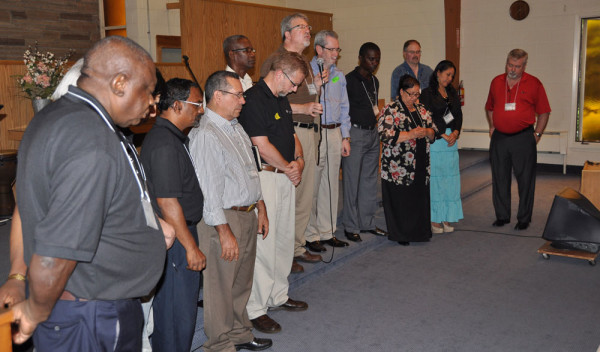
The General Conference delegates lined up at the front of the Stanley Park UB church in Kitchen, Ontario.
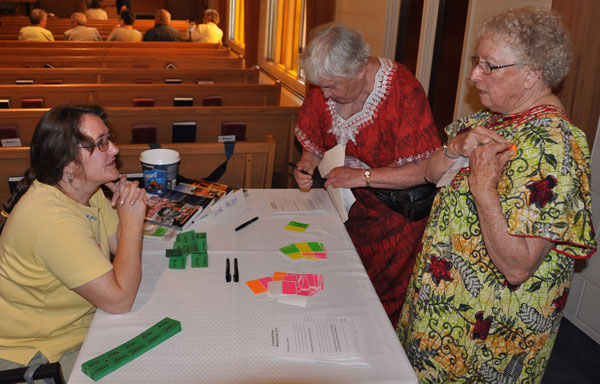
Former Sierra Leone missionaries Kathy Jones (right) and Audrey Federlein registering for the conference.
General Conference actually ended on May 31. But on Saturday, June 1, the Canadian conference held a missions conference at the Stanley Park UB church in Kitchener, Ontario. All of the national leaders had a chance to speak. It was a unique opportunity for the UBs of Canada to hear from such wide range of United Brethren leaders from around the world–probably a once-in-a-lifetime thing.
The conference started at 10am Saturday morning and concluded around 3 pm, with the church serving lunch. Paul Plato, Canada’s missions chairman, led the conference and kept things moving, with one person after another speaking.
Up to that point, all of the General Conference delegates had been staying at Emmanuel Bible College in Kitchener. But now, the group split up, with some of the delegates–those from Central America, Mexico, Jamaica, and Haiti– going home with missions conference attendees to their churches, where they would speak on Sunday morning. That left only the Hong Kong and US delegates spending the night at Emmanuel Bible College.
Bishop Phil Whipple would speak Sunday morning at Mill Crossing in nearby Cambridge, and Yiu Kin Keung would speak at Stanley Park. Jeff Bleijerveld was lined up to speak at the Stevensville UB church in the Niagara area.
Many more photos are posted on the United Brethren Facebook page.
01 Jun Facebook Galleries of National Conference
Photo galleries from each day of General Conference have been posted on the United Brethren Facebook page.
We’re talkin’ several hundred photos, all with captions. Take a look.
01 Jun Eavesdropping on the International Executive Committee
 Brian Magnus (right), Chairman of the General Conference
Brian Magnus (right), Chairman of the General Conference
At the close of the 51st General Conference, the delegates and observers were excused and the International Executive Committee (IEC) met. This group consists of the bishop or general superintendent of each United Brethren national conference.
The meeting included several items:
1. We evaluated the General Conference and its current format. It was agreed that the 51st General Conference was a success and that the format is valuable and worth continuing. It was felt that the camaraderie, inspiration, and encouragement are worth keeping
2. We discussed some large issues in multiple national conferences, including the stationing of pastors who have been divorced and the issue of homosexuality in the church. The IEC agreed unanimously that no person in an active homosexual relationship could be a pastor in any United Brethren church around the world.
3. We agreed that future General Conferences will need to be held in locations where it is cost effective, and where delegates from various countries have a greater likelihood of being admitted into the country. Jamaica is one country that would meet these criteria.
4. At the end of the IEC meeting, Brian Magnus, Bishop of the United Brethren Church in Canada, was elected to anther term as chairman of the IEC. Since the chairman is also the chair of the next General Conference, this term goes until the election of the next chairman after the next General Conference. Brian has chaired the IEC since it was formed in 2002.
01 Jun The 2013 General Conference Delegates
Each national conference is eligible to send two voting delegates to General Conference. The international bylaws call for “the bishop or equivalent and his or her designee.” National conferences are responsible for the expenses of their own delegates.
Each of the ten national conferences named two delegates. However, three national conferences sent no delegates, and two sent only one delegate. Here’s the entire list of delegates. The ones who didn’t attend are in italics (the issues primarily involved problems getting visas to Canada).
Canada
Rev. Brian Magnus, bishop
Mr. Paul Plato, missions team leader
Guatemala
Rev. Francisco Najera, superintendent
Mrs. Trinidad Gonzalez de Najera
Honduras
Rev. Mrs. Juanita Chavez, superintendent
Ms. Damaris Canales
Hong Kong
Rev. Yiu Kin Keung, superintendent
Mr. Daniel Ko
Jamaica
Rev. Isaac Nugent, bishop
Rev. Winston Smith, pastor
Mexico
Rev. Denis Casco, bishop
Rev. Guadalupe Vazquez
Nicaragua
Rev. Juan Pavon, superintendent
Mr. Sergio Canda Garcia
Philippines
Rev. Prudencio Lim, superintendent
Mr. Aaron Lim
Sierra Leone
Rev. John Pessima, bishop
Mr. Sahr Kobio Foyoh
United States
Rev. Phillip Whipple, bishop
Rev. Jeffrey Bleijerveld, Global Ministries director
Mrs. Donna Hollopeter, associate director of Global Ministries, served as secretary of the General Conference. Mr. Jorge Botero provided Spanish/English translation.
Also attending were the leaders of two mission districts. A mission district consists of United Brethren churches in a country which are not yet organized as a national conference, and are under the supervision of an existing national conference.
- El Salvador: Rev. Gonzalo Alas, superintendent
- Haiti: Rev. Oliam Richard
We have several other mission districts which were not represented at General Conference:
- Thailand and Macau: under the supervision of Hong Kong.
- Costa Rica: under the supervision of Nicaragua.
- India: under the supervision of the United States.
- Germany: under the supervision of Sierra Leone.
In addition:
- Mexico Conference oversees about ten Hispanic churches in the United States (Los Angeles; El Paso, Texas; Santa Fe, New Mexico; Chicago; and Miami.
- Hong Kong oversees a church in Poland.
- Hong Kong oversees a ministry in Myanmar.
- Mexico has started a ministry in Belize.
- 1
- 2

